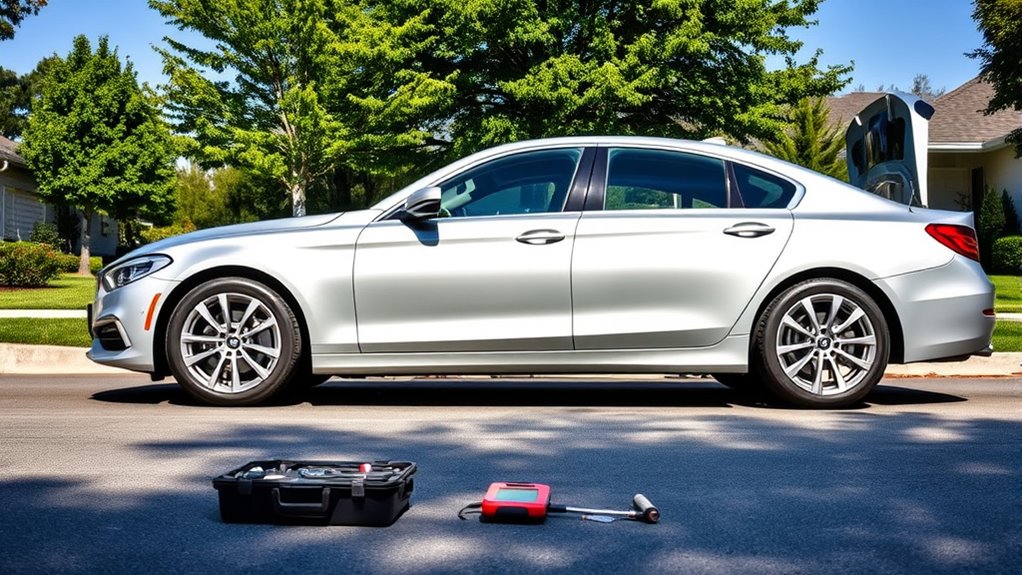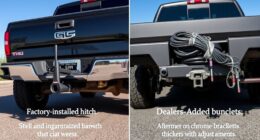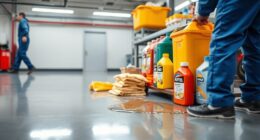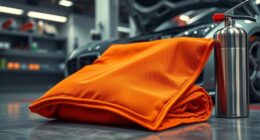If you notice a sudden drop in your fuel economy, start by inspecting your tire pressure and verify your tires are properly inflated. Check your air filter for dirt or clogging, and replace it if needed. Examine your spark plugs for wear and make sure your fuel injectors are clean. Also, review your driving habits, avoiding aggressive acceleration or idling. Continuing on will reveal more common causes and solutions to improve your vehicle’s efficiency.
Key Takeaways
- Check tire pressure to ensure tires are properly inflated; underinflation increases fuel consumption.
- Inspect the air filter for dirt or clogs; a dirty filter restricts airflow and reduces efficiency.
- Test spark plugs for wear or fouling; faulty plugs cause misfires and higher fuel use.
- Examine fuel injectors for clogs; dirty injectors disrupt fuel delivery and decrease mileage.
- Review driving habits; aggressive driving and idling can significantly lower fuel economy.

Have you noticed your vehicle’s fuel economy declining recently? If so, you’re not alone. A sudden drop in fuel efficiency can be frustrating and confusing, especially if you haven’t changed your driving habits. Luckily, many issues that cause this problem are straightforward to identify and fix. The first step is to understand what might be causing your vehicle to burn more fuel than usual so you can address it promptly.
One of the most common culprits is underinflated tires. When your tires aren’t properly inflated, your engine has to work harder to move the vehicle, which increases fuel consumption. Take a moment to check your tire pressure against the recommended levels in your owner’s manual or on the tire placard usually found on the driver’s side door jamb. If the tires are low, inflate them to the correct pressure—doing so can often restore lost fuel economy quickly.
Underinflated tires increase fuel consumption; check and maintain proper tire pressure for better efficiency.
Another area to inspect is your air filter. A dirty or clogged air filter restricts airflow to the engine, causing it to run inefficiently. When this happens, your engine compensates by burning more fuel to produce the same power. Open the air filter housing and examine the filter. If it appears dirty or clogged, replacing it is a simple and inexpensive fix that can considerably improve your vehicle’s efficiency.
Your spark plugs also play an essential role in fuel economy. Worn or fouled spark plugs can cause misfires or incomplete combustion, which wastes fuel. If your spark plugs haven’t been replaced according to your vehicle’s maintenance schedule, it’s a good idea to have them checked or replaced. Properly functioning spark plugs ensure the combustion process is efficient, helping you get the most out of every gallon.
Additionally, check your fuel injectors. Over time, they can become clogged or dirty, leading to uneven fuel delivery. This can cause your engine to run rough or consume more fuel. A fuel system cleaning or injector service can help restore proper flow and improve efficiency.
Furthermore, pinball machines, much like your vehicle, rely on precise components working together efficiently, and neglecting maintenance can lead to performance issues—similarly, neglecting your vehicle’s systems can cause a drop in fuel economy.
Lastly, consider your driving habits. Aggressive acceleration, high speeds, and frequent idling can all contribute to lower fuel economy. Maintaining steady speeds, avoiding rapid acceleration, and reducing unnecessary idling can make a noticeable difference.
Also, ensure your vehicle’s sensors and onboard systems are functioning properly, as issues here can affect fuel efficiency.
Frequently Asked Questions
Can Driving Habits Affect Sudden Fuel Economy Drops?
Yes, your driving habits can cause sudden drops in fuel economy. Aggressive driving like rapid acceleration, high speeds, and hard braking consume more fuel. Excessive idling or carrying heavy loads also reduce efficiency.
To improve, drive smoothly, maintain steady speeds, and avoid unnecessary idling. Regularly check tire pressure and vehicle maintenance, as these habits and conditions directly impact fuel consumption.
Adjusting your driving style can help restore peak fuel economy.
How Often Should I Check My Vehicle’s Fuel System?
Think of your vehicle’s fuel system as the heart of your car’s performance; you should check it at least every 6,000 to 10,000 miles or during routine maintenance.
Regular inspections include replacing filters, checking for leaks, and cleaning injectors. If you notice a sudden drop in fuel economy, don’t wait—inspect sooner.
Staying vigilant helps keep your car running smoothly, much like a well-tuned orchestra.
Do Older Vehicles Experience More Frequent Fuel Economy Issues?
Yes, older vehicles often experience more frequent fuel economy issues. Over time, parts like the fuel injectors, sensors, and the exhaust system can wear out or become clogged, reducing efficiency.
Additionally, aging engines may not run as smoothly, causing higher fuel consumption. Regular maintenance helps, but if you notice a sudden drop, it’s wise to inspect these components sooner to prevent further problems and optimize your vehicle’s performance.
Can Weather Conditions Impact Fuel Efficiency Significantly?
Weather conditions can considerably impact your vehicle’s fuel efficiency. Cold temperatures make your engine work harder, and cold weather can thicken oil, reducing lubrication.
Hot weather increases air conditioning use, which also lowers mileage. Wind resistance during storms can cause your car to consume more fuel, and low tire pressure from cold temperatures can decrease efficiency.
You should monitor weather impacts and adjust driving habits or vehicle maintenance accordingly to optimize fuel economy.
Is It Safe to Continue Driving With a Sudden Fuel Economy Decrease?
When your fuel economy suddenly drops, it’s wise to pause and assess your vehicle’s condition.
Don’t ignore warning signs like strange noises, dashboard alerts, or difficulty accelerating. Continuing to drive could lead to more damage or unsafe situations.
Conclusion
Think of your car’s fuel economy like a delicate clockwork. When one gear slips, everything slows down. I once ignored a sudden drop in my mileage, only to find a clogged air filter. After cleaning it, my fuel efficiency returned to normal—just like fixing a tiny gear restored the clock’s rhythm. Stay vigilant and inspect regularly, because small issues can silently sabotage your savings, turning a smooth ride into a costly detour.









